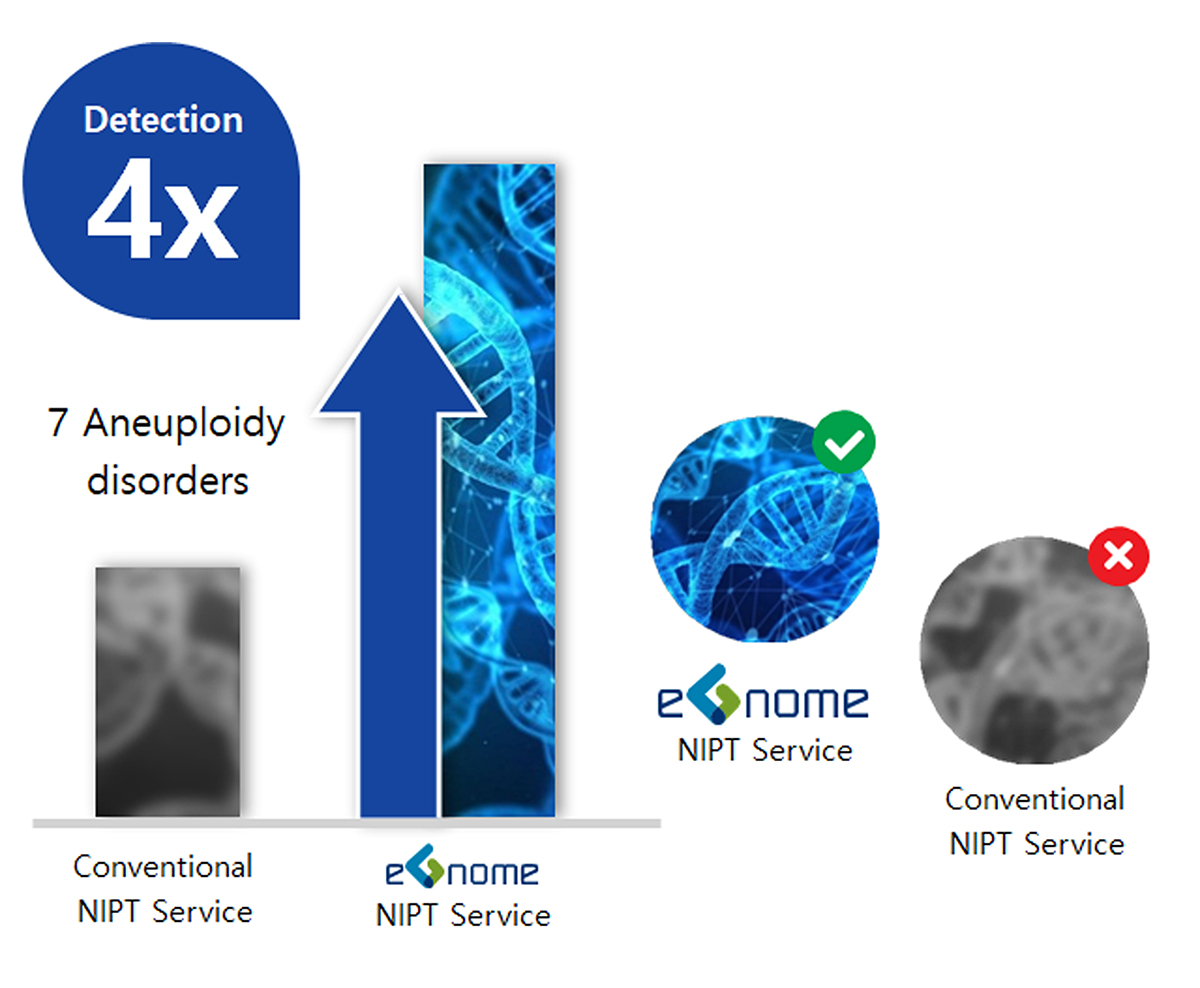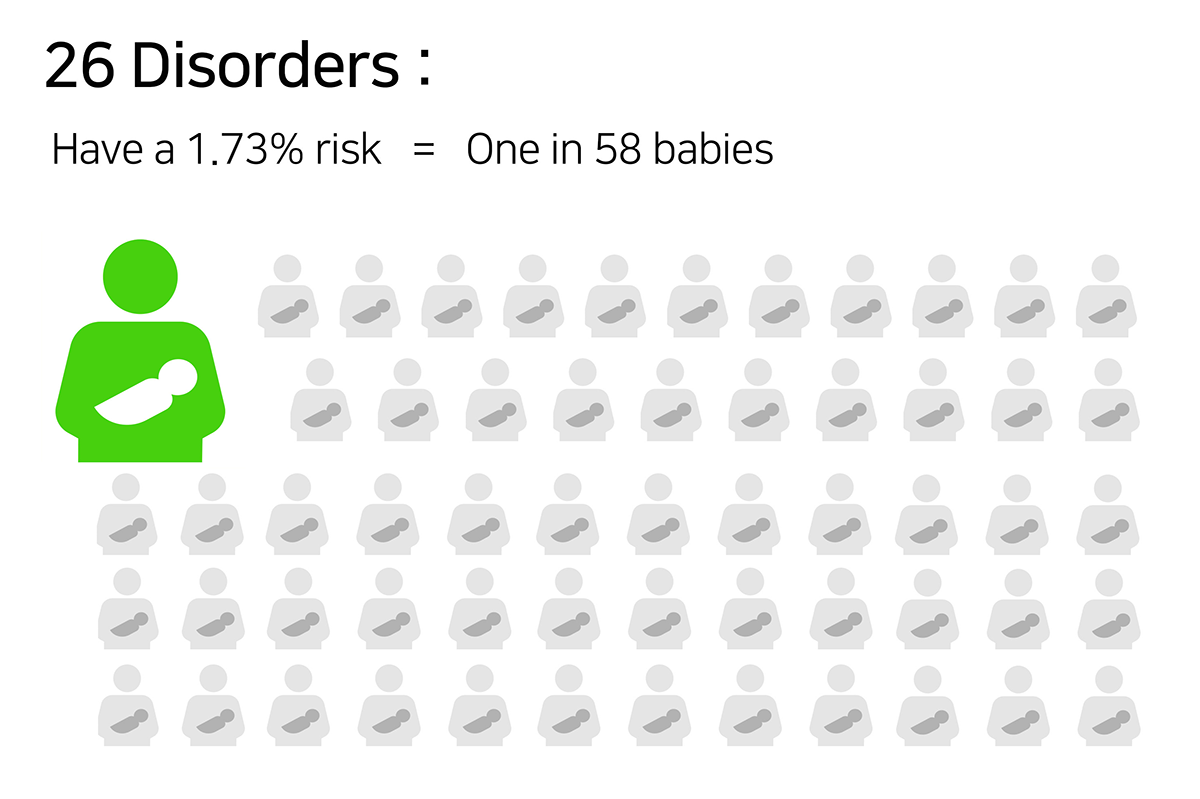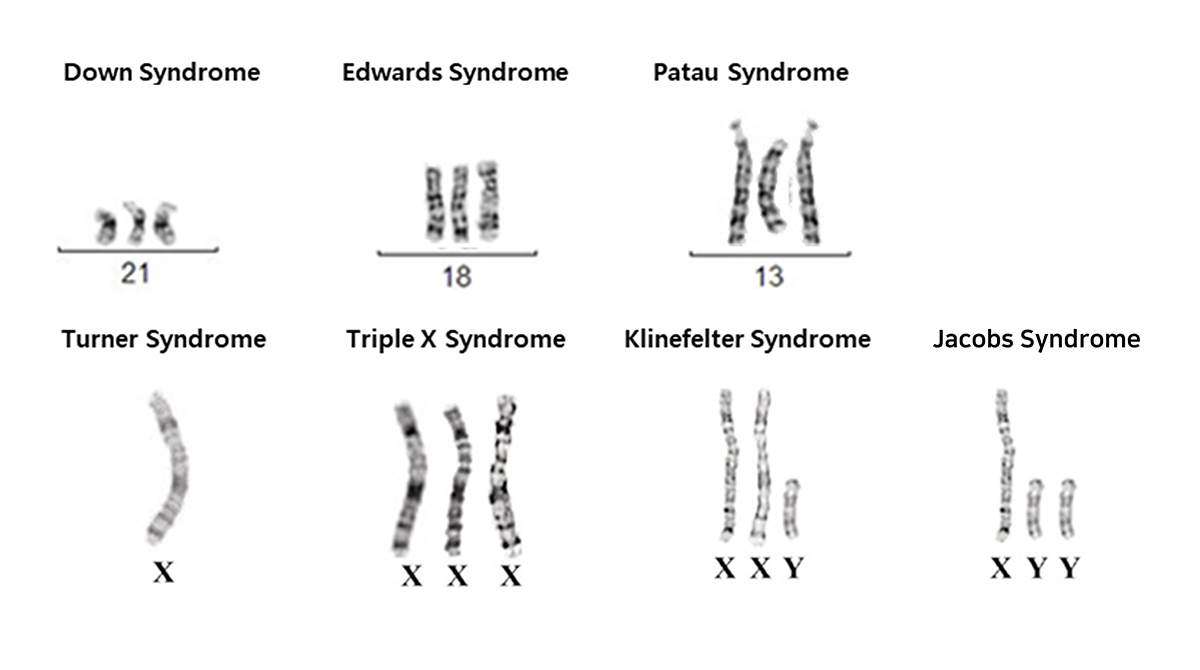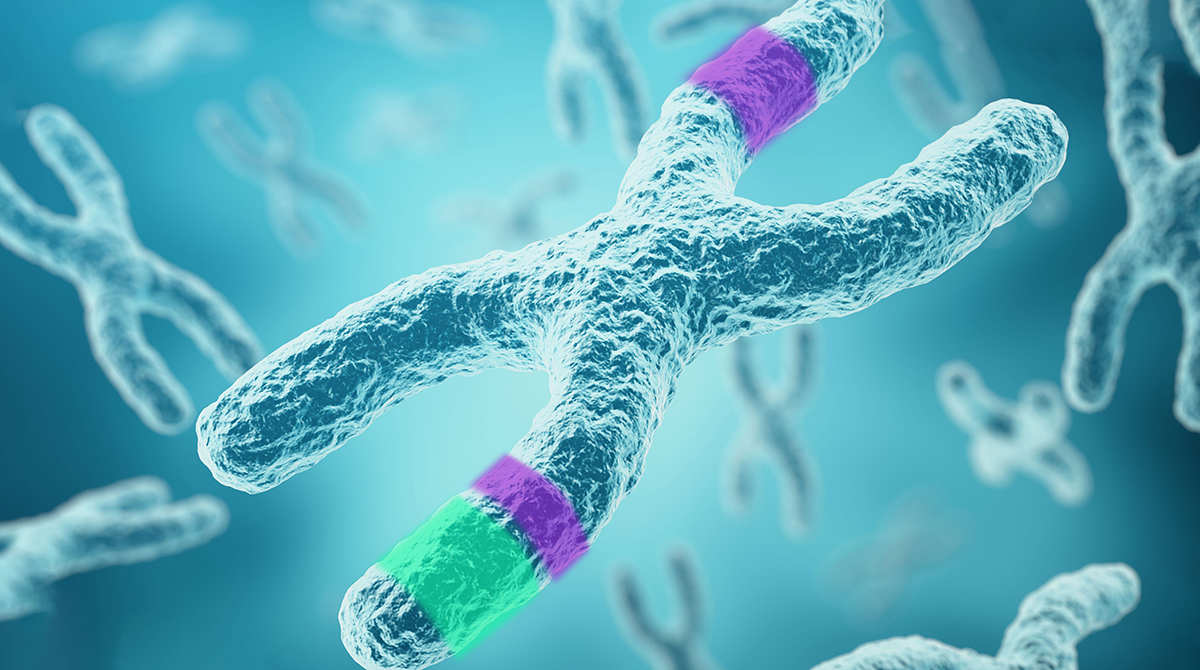
- KOR
- |
- ENG
왜 EG NIPT PRO가 산전 관리에 필요할까요?
유전 질환의 조기 발견
EG NIPT PRO를 통해 임신 초기에 잠재적인 유전 질환을 확인할 수 있습니다. 비침습적 산전 검사(NIPT)는 공중 보건 및 산전 관리를 개선하는 데 중요한 역할을 합니다. EG NIPT PRO를 활용하셔서 태어날 아기를 위한 최고의 케어를 경험해 보세요.
EG NIPT PRO의 장점
-
 유전 질환의 조기 발견
유전 질환의 조기 발견유전 질환을 조기에 식별함으로써 예비 부모는 임신 관리에 대한 정보에 입각한 결정을 내릴 수 있습니다.
-
 위험 감소
위험 감소EG NIPT PRO는 양수 검사(유산 위험 0.5~1%)와 같은 침습적 검사와 비교할 때 위험이 전혀 없는 안전한 검사입니다. 산모와 태아 모두의 위험을 최소화할 수 있습니다.
-
 공중 보건 혜택
공중 보건 혜택진단되지 않은 유전 질환의 발생률을 줄임으로써 공공 의료비를 절감하고 국민 건강을 개선합니다.
-
 유전 질환의 부담 경감
유전 질환의 부담 경감조기 진단 및 치료를 통한 영향을 받는 개인의 삶의 질을 향상시키고 개인과 공공 의료의 부담을 줄일 수 있습니다.
EG NIPT PRO는 특정 상태의 위험을 평가하는 선별 검사로, 확진을 제공하지 않는다는 점을 명심하는 것이 중요합니다. 양성 결과는 확인을 위해 진단 검사가 필요합니다.

EG NIPT PRO는 3세대 시퀀싱을 활용하여 최첨단 NIPT 서비스를 도입합니다. 이 진보된 기술은 보다 포괄적인 유전적 스크리닝을 가능하게 하여 우수한 정확도와 광범위한 검출 범위를 제공합니다.

위험 평가
EG NIPT PRO를 사용하면 유전 질환을 하나 이상 발견할 가능성은 약 58명 중 1명, 즉 1.73%의 위험률을 가집니다.
이로 인해 아기의 유전적 건강을 이해하는 데 중요한 도구가 됩니다.

EG NIPT PRO는 염색체 수적 이상을 감지하여 다음과 같은 상태를 식별합니다
-
다운 증후군(21번 삼염색체증)21번 염색체가 하나 더 많음.
-
에드워드 증후군(18번 삼염색체증)18번 염색체가 하나 더 많음.
-
파타우 증후군(13번 삼염색체증)13번 염색체가 하나 더 많음.
-
터너 증후군X 염색체가 하나 부족함.
-
트리플 X 증후군여성에게 X 염색체가 하나 더 많음.
-
클라인펠터 증후군(XXY)남성에게 X 염색체가 하나 더 많음.
-
XYY 증후군남성에게 Y 염색체가 하나 더 많음.

이 테스트는 전체 유전체의 구조적 변이를 분석하여 다양한 유전 질환과 염색체 이상에 대한 심도 있는 분석을 제공합니다.
-
낭포성 섬유증폐와 소화 시스템에 영향을 미치는 유전 질환.
-
겸상적혈구 빈혈적혈구가 낫 모양이 되어 다양한 건강 문제를 일으키는 혈액 질환.
-
테이-삭스 병뇌와 척수의 신경 세포를 파괴하는 치명적인 유전 질환.
-
페닐케톤뇨증 (PKU)신체가 아미노산 페닐알라닌을 분해할 수 없는 대사 질환.
-
헌팅턴 병운동, 인지 및 감정에 영향을 미치는 퇴행성 뇌 질환.
-
마르팡 증후군심장, 눈 및 골격에 영향을 미치는 결합 조직 질환.
-
신경섬유종증 1형 (NF1)신경 조직에 종양이 생기는 질환.
-
신경섬유종증 2형 (NF2)청력 및 균형을 조절하는 신경에 양성 종양이 생김.
-
듀시엔형 근이영양증주로 남아에게 영향을 미치는 중증의 근이영양증.
-
혈우병 A응고 인자 VIII의 결핍으로 인한 출혈 질환.
-
혈우병 B응고 인자 IX의 결핍으로 인한 혈우병 A와 유사한 질환.
-
22q11.2 결실 증후군 (디조지 증후군)심장 결함, 면역 문제 및 발달 지연을 일으킴.
-
1p36 결실 증후군지적 장애 및 발작을 유발함.
-
엔젤만 증후군신경계를 영향을 미쳐 발달 지연 및 언어 장애를 일으킴.
-
프래더윌리 증후군식욕이 멈추지 않아 비만 및 지적 장애를 초래함.
-
미토콘드리아 근병증미토콘드리아에 영향을 미쳐 근육 약화 및 신경학적 문제를 초래함.
-
레버씨 시신경 위축증 (LHON)시신경의 퇴행으로 인한 갑작스러운 시력 상실을 유발함.
-
BRCA1 및 BRCA2 유전자 변이유방암 및 난소암의 위험을 증가시킴.
-
린치 증후군대장암 및 기타 암의 위험을 증가시킴.
-
Q: EG NIPT PRO 테스트는 언제 고려해야 하나요?
A: EG NIPT PRO는 일반적으로 임신 10주 이후에 권장됩니다. 이 검사는 모든 임산부에게 적합하며, 특히 35세 이상의 고령 임산부, 유전 질환의 가족력이 있는 경우 또는 다른 산전 검사에서 이상 소견이 발견된 경우와 같은 염색체 이상 위험이 높은 임산부에게 적합합니다. 아기의 유전적 건강에 대한 조기 안심을 원하는 예비 부모에게도 좋은 선택입니다.
-
Q: EG NIPT PRO는 위험한가요?
A: EG NIPT PRO는 매우 안전합니다. 이 검사는 비침습적이며 어머니의 혈액 샘플만 필요하므로 태아에게 위험을 초래하지 않습니다. 소량의 유산 위험이 있는 양수 검사와 같은 침습적 절차와 달리, EG NIPT PRO는 이러한 위험이 없으므로 초기 산전 검사로 선호됩니다.
-
Q: EG NIPT PRO가 항상 정확한가요?
A: EG NIPT PRO는 매우 정확하지만 완벽하지는 않습니다. 이는 선별 도구로, 특정 유전 상태의 위험을 평가하지만 확진을 제공하지 않습니다. 드물게 조건이 존재하지 않는 고위험을 나타내는 경우(위양성)와 조건을 놓치는 경우(위음성)가 발생할 수 있습니다. 따라서 모든 고위험 결과는 추가 진단 검사를 통해 확인해야 합니다.
-
Q: EG NIPT PRO가 평가를 할 수 없는 경우는 어떻게 하나요?
A: EG NIPT PRO가 결정적인 결과를 제공할 수 없는 경우도 있습니다. 이는 어머니의 혈액 샘플에 태아 DNA가 충분하지 않은 경우 발생할 수 있으며, 이는 임신 초기에 더 가능성이 높거나 어머니의 체중이 높은 경우 발생할 수 있습니다. EG NIPT PRO가 평가를 할 수 없는 경우 당사에 연락하시기 바랍니다.
최첨단 NIPT 서비스를 통하여 이지놈은 국내외적으로 산전 유전자 스크리닝의 선구자로 미래를 이끌고 있습니다. 이지놈은 예비 부모에게 가장 포괄적이고 정확한 유전 정보를 제공하며, 다양한 국가의 의료 서비스 품질을 변혁하고, 업계에서 새로운 표준을 설정하기 위하여 노력하고 있습니다.
